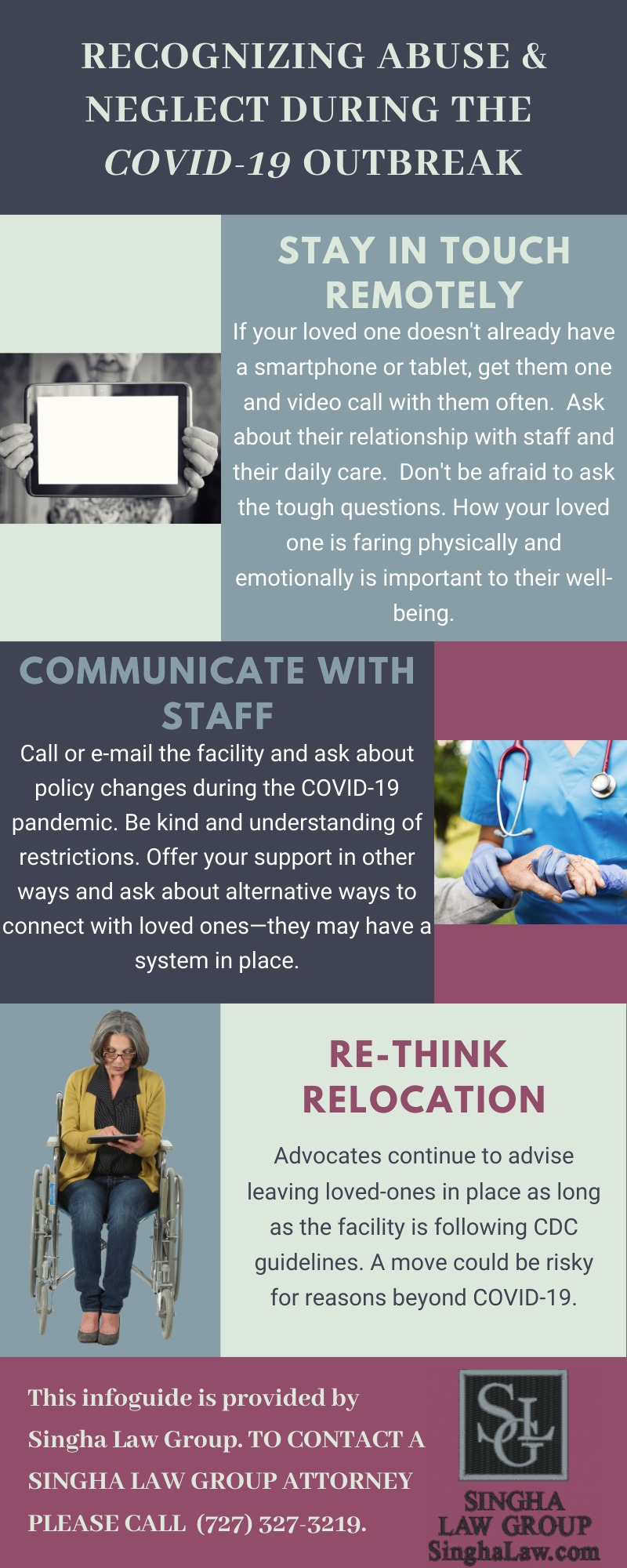COVID-19 IMPACTS ON NURSING HOME ABUSE
April 24, 2020
BY LINDSAY POLEGA
In light of the spread of COVID-19 across the United States, the Centers for Disease Control and Prevention (“CDC”) has issued guidance concerning nursing home visitations. The CDC guidelines recommend that nursing homes:
- Restrict all visitation except for certain compassionate care situations, such as end of life situations
- Restrict all volunteers and non-essential healthcare personnel (HCP), including non-essential healthcare personnel (e.g., barbers)
- Cancel all group activities and communal dining
- Implement active screening of residents and HCP for fever and respiratory symptoms
President Trump asked long-term care facilities to suspend non-essential visits and the Centers for Medicare & Medicaid Services (“CMS”) also released guidance on how nursing home facilities should accept patients who may have been exposed to COVID-19 to best protect residents. This guidance provides that nursing homes should readmit residents who have been exposed or tested positive for COVID-19 only if the facility is equipped to prevent the spread of the virus.
There is no doubt that these extra measures are needed—especially in nursing homes where the residents are among the population at highest risk of being affected by COVID-19. Here in Pinellas County, one nursing home, Freedom Square of Seminole, began evacuating residents after 3 residents passed away this past weekend from coronavirus complications. As of April 17th, about 30 patients and staff at the home have tested positive for COVID-19.
Most nursing homes are largely taking steps to protect their residents, including reducing the minimum staffing requirements to prevent sick staff members from infecting residents. Unfortunately, the risk of a diminished staff means an increased risk of nursing home abuse. Most nursing home abuse cases are not intentional, and understaffing is often at the root of most nursing home abuse and neglect cases. COVID-19 has only heightened the risk that negligence may occur.
Here in Florida, at least 962 positive cases of coronavirus have been discovered in nursing homes and more than 3,600 deaths nationwide have been linked to nursing homes and long-term care facilities. The State has issued an emergency order prohibiting visitation to nursing homes, assisted living facilities and other long-term care facilities except by family and friends during end of life situations or for the purposes of healthcare or legal services. The State has also advised nursing homes to educate and train healthcare personnel not to report to work when ill and to reinforce infection prevention and control measures.


In a letter to Gov. Ron DeSantis earlier this month, the Florida Health Care Association requested “immunity from any liability, civil or criminal” for nursing homes, hospitals, and other facilities that may result from treating individuals with COVID-19 during this public health emergency. Florida’s Agency for Health Care Administration said that the letter had been received and will be reviewed, but has already acknowledged that even if it grants some immunity, there should be an exception. Based on comments made by the Administration, negligence based on staffing shortages would not be granted immunity.
Seniors living in nursing homes are already the most vulnerable in society, and even more so amid the pandemic. In a perfect world the nursing home employees would have all of the resources they need to support our loved ones through this time of hardship, but, sadly, these workers often make poverty-level wages and can’t afford to miss a day of work. Sick workers may ignore symptoms and exposed workers not currently exhibiting symptoms may not feel the need to stay home, risking COVID-19 exposure to residents.
Abuse can come in many forms and it will be more difficult to catch from afar. Singha Law Group has offered these infographics with a few tips to help you detect nursing home abuse amidst the COVID-19 pandemic.
Suspected abuse, neglect or exploitation should be reported to the Department of Children and Families Adult Protective Services and the Aging Network right away, and if necessary, contact an attorney at Singha Law Group. These events can also be reported by phone to the Florida Abuse Hotline at 1-800-96-ABUSE (1-800-962-2873). Press 1 to report suspected abuse, neglect or exploitation of a vulnerable adult. This toll free number is available 24/7. TTY (Telephone Device for the Deaf): 1-800-955-8771.